All pregnancies involve risk, but high-risk pregnancies face many more challenges due to the problems both the expectant mother and fetus can experience during gestation. When consulting with your obstetrician about the potential for pregnancy, it’s essential to know how your personal health may affect those outcomes and what plans would need to be put in place to help you achieve a successful pregnancy. Many contributing factors can cause a high-risk pregnancy. At Rosenburh Maternal-Fetal Medicine, we’re here to help you through every hurdle you may face to give you the most favorable outcomes.
Identifying The Signs Of High-Risk Pregnancy
High-risk pregnancies refer to a higher ratio of factors involved within the trimesters of a woman’s pregnancy. Pre-existing conditions can cause some factors before pregnancy; health conditions can develop during pregnancy or occur from outside, and environmental factors such as unhealthy diets, smoking, alcohol consumption, and excessive stress. In these cases, prenatal care and consistent health checkups are essential for women diagnosed with high-risk pregnancies. These appointments help doctors like ours track developing symptoms, ongoing conditions, and other factors that may impact the mother and the fetus during development.
While most cases involve pre-existing conditions, some conditions may develop during the pregnancy and cause symptoms that require immediate attention. These symptoms include:
- Vaginal Bleeding: In early pregnancy, vaginal bleeding may indicate cervical changes or problems with embryo implantation. It can also pinpoint miscarriage, vaginal infection, ectopic pregnancy, low-lying placenta, placental abruption, and other conditions and require urgent attention from an obstetrician, fetal-medicine specialist, or in worse cases, an emergency doctor to diagnose and treat.
- Severe Headaches: Headaches can result from various factors, including poor quality sleep, excessive stress, hormonal changes, low blood sugar, caffeine withdrawal, and other outside factors, but Headaches on a higher pain scale that doesn’t go away can cause blurry vision, and dizziness can indicate the early warning signs of preeclampsia.
- High Blood Pressure: Signs of high blood pressure during pregnancy, also known as toxemia, can lead to high levels of protein in the urine. This causes severe headaches, shortness of breath, nausea, vomiting, upper abdominal pain, temporary loss of vision, sensitivity to light, weight gain, edema, and preeclampsia.
Other urgent symptoms include loss of consciousness, frequent urination, leaking of vaginal fluid, excessive thirst, extreme fatigue, persistent pelvic pressure, chest pain, high fever, and intolerable pain in the pelvic area.
As listed, many symptoms that appear unusual during pregnancy are often warning signs of a high-risk pregnancy. In these cases, it’s essential to schedule a prenatal appointment with your obstetrician to get referred to a fetal medicine specialist. Fetal medicine specialists work to help patients through high-risk pregnancies by diagnosing unusual symptoms and treating their co-existing conditions through the latest techniques.
Visit Rosenbery Maternal Fetal Medicine For A High-Risk Pregnancy Consultation
If your OBGYN wants to refer you to a fetal-medicine specialist, seek out Rosenberg Maternal Fetal Medicine by calling either (516) 501-9840 in Hewlett or (845) 764-9880 in Suffern. Our team can guide you through your pregnancy and ensure you and your future child are properly cared for by providing the latest treatments throughout the Hewlett and Suffern, NY, areas.

